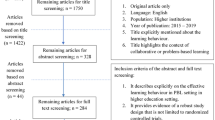Abstract
Objective
The Teaching for Learning and Collaboration (TLC) Program is a teaching-skills program focusing on methods to improve student learning. This program was adopted to address the professional and personal challenges faced by International Medical Graduates (IMGs) completing a fellowship in psychosomatic medicine.
Method
The authors conducted a literature review on the educational challenges encountered by IMGs. Based on this review, an adapted TLC Program was piloted on four IMG fellows who completed a psychosomatic medicine fellowship between 2008 and 2011.
Results
Teachers using the adapted TLC Program reported the following as being significant in the IMG training process: a safe educational environment; having an extended period of time for assessment and fellow adjustment; and more direct, rather than “diplomatic,” feedback.
Conclusions
Although piloted in a psychosomatic medicine fellowship, the TLC program is intended to be generalizable to other medical training settings. Further evaluation of the effectiveness of this approach for IMGs is required.
Similar content being viewed by others
References
Dictionary.com; available at http://dictionary.reference.com/browse/orientation; accessed on April 1, 2011
Educational Commission for Foreign Medical Graduates: 2011 Information Booklet-ECFMG Certification; available at http://www.ecfmg.org/2011ib/2011ib.pdf; accessed on April 1, 2011
American Psychiatry Association: Resident Census, 2010–11; available at www.psych.org/MainMenu/EducationCareerDevelopment/EducationalInitiatives/residentcensus/1011census.aspx?FT=.pdf; accessed on February 14, 2012
Akl EA, Mustafa R, Bdair F, et al: The United States physician workforce and international medical graduates: trends and characteristics. J Gen Intern Med 2007; 22:264–268
Wong A, Lohfeld L: Recertifying as a doctor in Canada: international medical graduates and the journey from entry to adaptation. Med Educ 2008; 42:53–60
Rao NR: The Influence of Culture on Learning of Psychiatry: The Case of Asian-Indian International Medical Graduates. Int J Appl Psychoanal Stud 2007; 4:128–143
Akhtar S: A third individuation: immigration, identity, and the psychoanalytic process. J Am Psychoanal Assoc 1995; 43: 1051–1084
Hall P, Keely E, Dojeiji S, et al: Communication skills, cultural challenges, and individual support: challenges of international medical graduates in a Canadian healthcare environment. Med Teach 2004; 26:120–125
Pilotto LS, Duncan GF, Anderson-Wurf J: Issues forclinicians training international medical graduates: a systematic review. Med J Aust 2007; 187:225–228
Majumdar B, Keystone JS, Cuttress LA: Cultural sensitivity training among foreign medical graduates. Med Educ 1999; 33:177–184
Bates J, Andrew R: Untangling the roots of some IMGs’ poor academic performance. Acad Med 2001; 76:43–46
Whelan GP: Commentary: Coming to America: the integration of international medical graduates into the American medical culture. Acad Med 2006; 81:176–178
Mori B, Kwan D, Hawa R, et al: TLC-Teaching for Learning and Collaboration: A Clinical Teaching Skills Faculty Development Program. (Poster Presentation). University of Toronto, Faculty of Medicine Annual Education Achievement Day. April 30, 2007
Philpott J, Batty H: Learning best together: social constructivism and global partnerships in medical education. Med Educ 2009; 43:923–924
Raising the Bar: Recommended Standards for the Management of Clinical Fellowships: Report of the Fellowship Working Group Faculty of Medicine, University of Toronto, September 2009
Kramer MN: The educational needs of international medical graduates in psychiatric residencies. Acad Psychiatry 2005; 29:322–324
Author information
Authors and Affiliations
Corresponding author
Rights and permissions
About this article
Cite this article
Tan, A., Hawa, R., Sockalingam, S. et al. (Dis)Orientation of International Medical Graduates: An Approach to Foster Teaching, Learning, and Collaboration (TLC). Acad Psychiatry 37, 104–107 (2013). https://doi.org/10.1176/appi.ap.11040074
Received:
Revised:
Accepted:
Published:
Issue Date:
DOI: https://doi.org/10.1176/appi.ap.11040074




